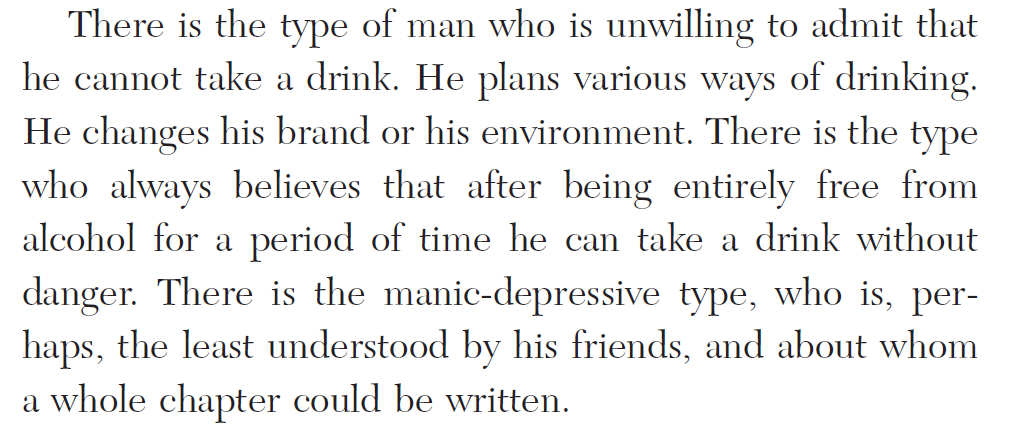AA has taught me that it is almost impossible to explain alcoholism to a family member who is not alcoholic.
“To Hell and Back—When I became a member of Alcoholics Anonymous in September 1988, I wasn’t sure that the program would work for me. But I was driven by the fear of what might happen to me and my children if I didn’t give it a try.
Fear was probably the very thing I needed to bring me to the point of surrender necessary to recover. When staying sober became my number-one priority, I started to do things differently. I went to many meetings, I got a sponsor, I created a network of people in recovery around me, I became a part of that same network by working with others, and sobriety became my — Tena W (Read more)
If I got a nickel for every time my wife or parents told me I needed “medication”, I would be a millionaire. I personally believe the “bi-polar & manic depressive” label is overused in the mental health profession. Even television now advertises all kinds of miracle drugs for insomnia, depression, etc.
My experience is that it is very important for the addict to be “open minded” and at least consider the advice offered by therapists. I personally have met with over a dozen psychologists, psychiatrists, LCSW and marriage counselors. I have even taken various prescriptions since 1995. The results are obvious, I’ve stayed clean and sober for over 18 years and married for over 12 years. So, I believe it works!
Nevertheless, at this point taking drugs is like following some of the suggestions in the 12 step program. Most people I know, have told me I could benefit. But then I have also received extreme recommendations and perhaps unusual advice from sponsors. For example, eating only certain foods and vitamins, getting more involved in the bible, practicing certain vipassana dharma meditation techniques, etc. Yet, when I examine their life, they have gross handicaps.
So, it’s my conclusion that therapy and pharmaceutical drugs can be very helpful to anyone struggling with addiction. But ultimately, it comes down to changing your behavior, actions, feelings and emotion. That’s all I can control. Taking a pill is not much different than the 15 years I spent “self medicating” myself with street drugs like cocaine, LSD psychedelic experience, hash, opium, hallucinogenic mushrooms, marijuana and alcohol.
Today, I still take drugs like caffeine in coffee and soda, sugar in candy and occasionally nicotine in cigarettes or cigars. Ironically, when I last me with a psychiatrist he prescribed “anti- anxiety” medication. I firmly believe my #1 goal every day is to eat healthy and exercise. They told me when I was new, that I have a 3-fold disease—mental, physical and spiritual.
I try to watch what I eat (e.g. carbohydrates in bread and pasta versus McDonalds and Taco Bell). As a matter of fact, I’m constantly learning new ideas from other people like the excerpts below. I have never tried acupuncture because I’m not a big fan of needles, but I’m not ruling it out.
Hypoglycemia, also known as low blood sugar or low blood glucose, is when blood sugar decreases to below normal. This may result in a variety of symptoms including clumsiness, trouble talking, confusion, loss of consciousness, seizures, or death. A feeling of hunger, sweating, shakiness, and weakness may also be present. Symptoms typically come on quickly.
The most common cause of hypoglycemia is medications used to treat diabetes mellitus such as insulin, sulfonylureas, and biguanides. Risk is greater in diabetics who have eaten less than usual, exercised more than usual, or drunk alcohol. Other causes of hypoglycemia include kidney failure, certain tumors, liver disease, hypothyroidism, starvation, inborn error of metabolism, severe infections, reactive hypoglycemia, and a number of drugs including alcohol. Low blood sugar may occur in babies who are otherwise healthy who have not eaten for a few hours. (Read more)
Hyperglycemia, or high blood sugar (also spelled hyperglycaemia or hyperglycæmia, not to be confused with the opposite disorder, hypoglycemia) is a condition in which an excessive amount of glucose circulates in the blood plasma.
Temporary hyperglycemia is often benign and asymptomatic. Blood glucose levels can rise well above normal for significant periods without producing any permanent effects or symptoms. However, chronic hyperglycemia at levels more than slightly above normal can produce a very wide variety of serious complications over a period of years, including kidney damage, neurological damage, cardiovascular damage, damage to the retina or damage to feet and legs. Diabetic neuropathy may be a result of long-term hyperglycemia.
Acute hyperglycemia involving glucose levels that are extremely high is a medical emergency and can rapidly produce serious complications (such as fluid loss through osmotic diuresis). It is most often seen in persons who have uncontrolled insulin-dependent diabetes.
The following symptoms may be associated with acute or chronic hyperglycemia, with the first three composing the classic hyperglycemic triad:
Polyphagia – frequent hunger, especially pronounced hunger
Polydipsia – frequent thirst, especially excessive thirst
Blurred vision, Fatigue (sleepiness), Weight loss, Dry mouth, Dry or itchy skin, Erectile dysfunction, Stupor, Seizures (Read more)
